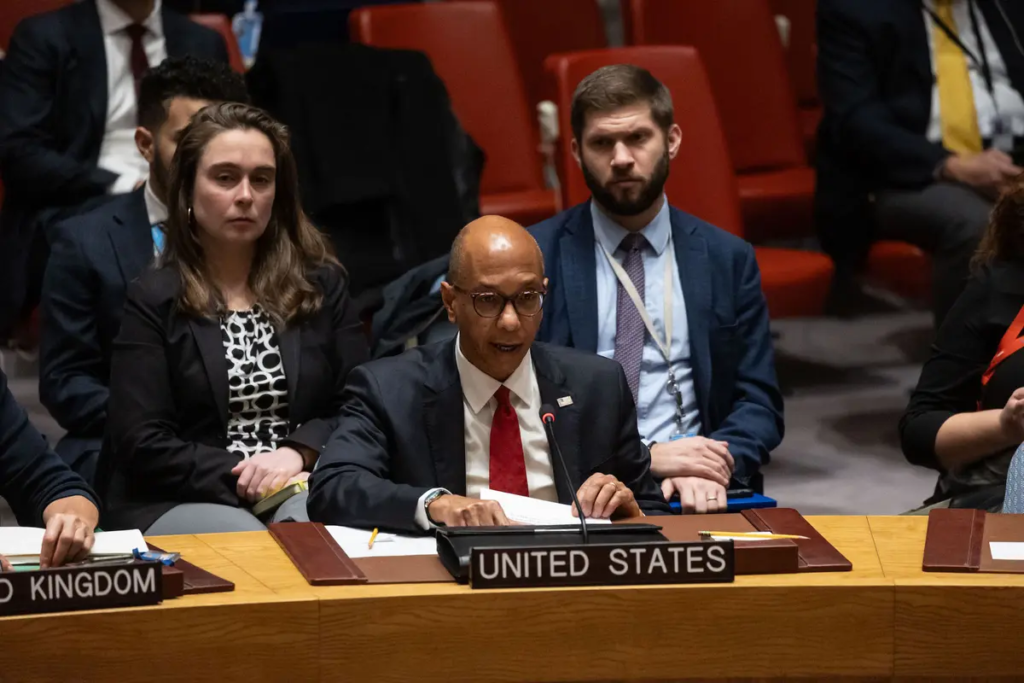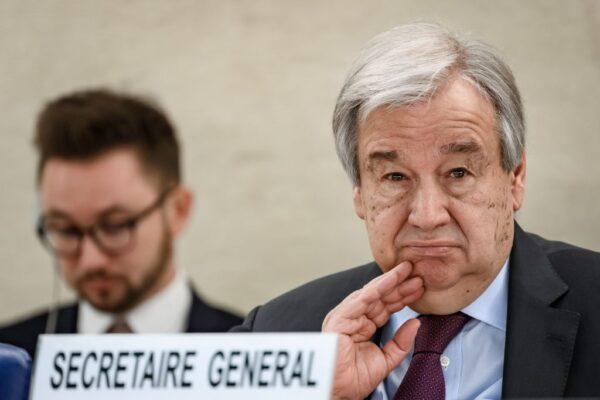
The US deputy ambassador to the UN Security Council said the draft resolution was ‘disconnected’ from reality.
The United States on Friday vetoed a U.N. Security Council resolution advocating for an immediate ceasefire in the Israel-Hamas war and criticized the council’s failure to condemn the Oct. 7 terror attacks as a “serious moral failure.”
In remarks to the Security Council, U.S. Deputy Ambassador to the U.N. Robert Wood said the draft text was “disconnected” from reality.
“We still cannot comprehend why the resolution’s authors declined to include language condemning Hamas’ horrific terrorist attack on Israel on October 7,” Mr. Wood said.
The United States, which holds veto power, is one of five permanent members of the Security Council, alongside Russia, China, France, and the United Kingdom. The non-permanent members include Brazil, Albania, Ecuador, Gabon, Ghana, Switzerland, the United Arab Emirates, Malta, and Japan.
The United Arab Emirates, which holds the presidency of the council for December, put forward the resolution, which 13 member nations voted in favor of, except for the United Kingdom, which abstained.
“This Council’s failure to condemn Hamas’ October 7th terrorist attacks—including its acts of sexual violence and other unthinkable evils—is a serious moral failure. And it underscores the fundamental disconnect between the discussions that we have been having in this Chamber and the realities on the ground,” said Mr. Wood.
The United States has actively supported Israel’s right to defend against terrorism through intensive diplomacy while at the same time aiding Gaza with humanitarian efforts. Despite these efforts, the breakdown of a temporary truce and the resumption of fighting occurred due to Hamas’s refusal to release hostages.
Many of the young female hostages that Hamas refused to release “are being subjected to cruel and inhumane treatment,” said Mr. Wood, citing survivor accounts.
While the United States supports “a durable peace” between Israelis and Palestinians, Mr. Wood noted that Hamas “continues to pose a threat to Israel and remain in charge of Gaza.”
BLM’s Misguided Sympathy for Hamas: Pastor Dumisani Washington
“That is not a threat that any one of our governments would allow to continue to remain on our own borders. Not after the worst attack on our people in several decades,” he said. “For that reason, while the United States strongly supports a durable peace in which both Israelis and Palestinians can live in peace and security, we do not support calls for an immediate ceasefire.
“This would only plant the seeds for the next war—because Hamas has no desire to see a durable peace, to see a two-state solution,” he added.
Mr. Wood also asserted that members of the U.N. Security Council “have an obligation to explain how their proposals will break the cycle of unceasing violence.”
“Our goal should not simply be to stop the war for today—it should be to end the war forever, break the cycle of unceasing violence, and build something stronger in Gaza and across the Middle East so that history does not keep repeating itself,” he said.

Article 99 a ‘New Moral Low’ for UN
The resolution was put forward after U.N. Secretary-General Antonio Guterres invoked Article 99 of the U.N. Charter on Wednesday to force the Security Council to address the Israel-Hamas conflict, saying “the international community has a responsibility to use all its influence to prevent further escalation and end this crisis.”
“The situation is fast deteriorating into a catastrophe with potentially irreversible implications for Palestinians as a whole and for peace and security in the region. Such an outcome must be avoided at all costs,” he wrote.
Israel’s U.N. ambassador, Gilad Erdan, took aim at the invocation of Article 99, which is reserved for crises that threaten international peace and security, decrying it as “a new moral low.”
Mr. Erdan pointed out that Article 99, invoked for the first time since the U.N. secretary-general assumed office in 2017, has not been utilized for other international crises, including the conflict between Russia and Ukraine, Syrian President Bashar Assad’s deployment of chemical weapons in Syria, and the civil war in Yemen.
“The Secretary-General’s call for a ceasefire is actually a call to keep Hamas’ reign of terror in Gaza. Instead of the Secretary-General explicitly pointing to Hamas’ responsibility for the situation and calling on the terrorist leaders to turn themselves in and return the hostages, thus ending the war, the Secretary-General chooses to continue playing into Hamas’ hands,” he wrote in a post on X.
Pressure is mounting on Israel over its military operations in the war-torn Gaza Strip. The Hamas-controlled Gaza Health Ministry has reported that more than 16,000 people have been killed. Hamas does not distinguish between its terrorist fighters and civilians.
Israeli officials have vowed to continue their operations until Hamas is wiped out.
While the United States supports Israel’s right to defend itself from terrorism, the Biden administration has also called on the country to take pains to protect civilians in Gaza.
On Thursday, Secretary of State Antony Blinken, who called for the protection of civilians in Gaza during a recent visit to Israel, said there appears to be a “gap” between his remarks “and the actual results that we’re seeing on the ground.”
